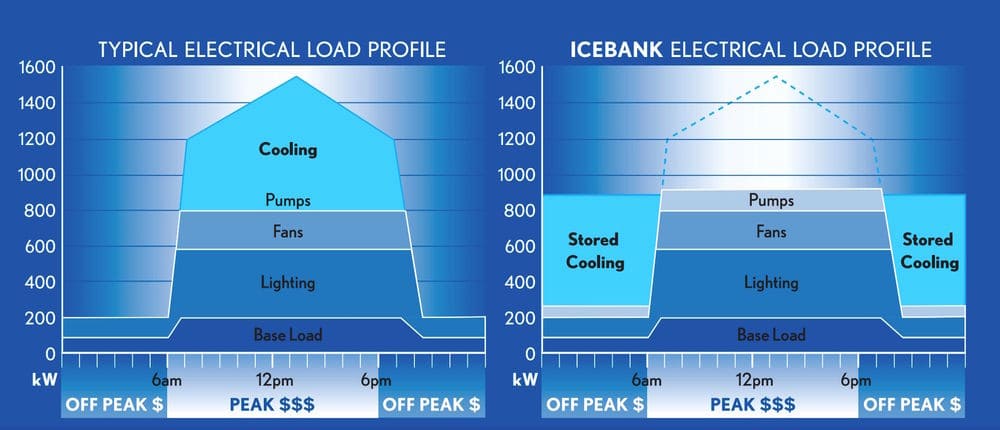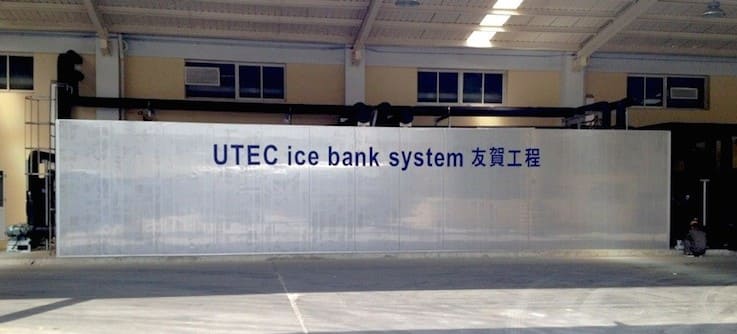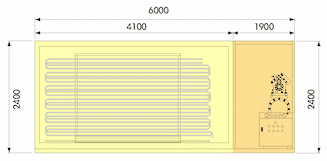Ice Bank
Ice Bank or Ice Storage system is a technology based on storing cooling capacity at night and leveraging it on the following day to meet the cooling load requirements. The system can be applied to various industrial factories and buildings, especially those have great changes of loads or high peak load during a day. Using an ice back system can reduce electricity costs; Besides, its low temperature cooling water is also required by process cooling. As environmental protection and tight power of electricity becomes global issues, companies in the world are gradually adopting ice storage systems to save energy.
 Source: CALMAC
Source: CALMAC
Although there are many types of ice storages like ice-on-coil type, ice-ball type, ice debris sliding type and ice crystal type, ice-on-coil type ice banks are especially recommended because of its high efficiency in ice making, low trouble rate, reasonable initial cost and long service life. The following introduction is generally based on ice-on-coil type ice storage systems.
Benefits (and Drawbacks)
| Benefits | Drawbacks |
|---|---|
|
|
System Structure and Working Principle
An ice-on-coil type ice back system basically contains a matching main engine of freezer, regenerative tank for storing ice, air feeding device for air compressor, refrigerant swelling valve, ice water pump, control panel, etc.
- When load of cooling is increasing, the temperature of return water will raise naturally to promote melting of ice gradually. Then those ice water shall be delivered by ice water pump to the place requiring cooling.
- After melting for a period of time, the chiller is operated to cool by the ice thickness detector or timer. When formed ice is upon the requested thickness, the main engine will stop operation by ice thickness detector or timer.
- To achieve high performance of storing ice, the design of thickness of ice-forming needs to take the thermal conductivity and energy consumption rate into account.
- For consistent temperature and uniform icing of each point inside regenerative tank, a low pressure air compressor is required to supply air to agitate cold water sufficiently.
Ice Storage and Process Cooling System

UTEC I/B Models
Besides custom-made ice bank systems, modular regenerative energy storages are also provided by UTEC. UTEC I/B models use brine as cooling medium and are designed to maximize the benefits of ice-on-coil type of ice storages.
Features
- Large area and high efficiency in cold storage freezing. Low cost and large effect in recycling.
- Save space for storing ice or regeneration, over 60% with IPF value.
- Convenient for installation and moving, also worth being re-bulit because of minimum loss of re-construction.
- Easy to operate and maintain. No need to break down ice water supply during the period of maintaining or repairing the compressor.
- High safety that ice-making and ice-melting are easy to observe.
- The system is designed to support each other at any time, and is easy to expand its capacity.
- It saves cost of land. Only a few space is required.
- Just water and power supply are required for operation.

Specification
| Model | UTEC-IB170 | UTEC-IB340 |
|---|---|---|
| Sectional View |

|

|
| Ice-Making Capacity | 170 USRT | 340 USRT |
| Brine Chiller | 40 HP, with reciprocating or screw compressor | 80 HP, with reciprocating or screw compressor |
| WT% of Brine | 30~40% | 30~40% |
| Ice Weight | 6,400 kg | 12,800 kg |
| Size | 6 m (L)×2.35 m (W)×2.4 m (H) | 12 m (L)×2.35 m (W)×2.4 m (H) |
| Weight | 28,500 kg | 51,000 kg |
Note 1: Capacity calculation is based on ice water at 0~1°C.
Note 2: UTEC standard products' capacity for ice making are designed below 350 USRT. Products with capacity above 350 USRT are custom designed according to actual load calculation.
























